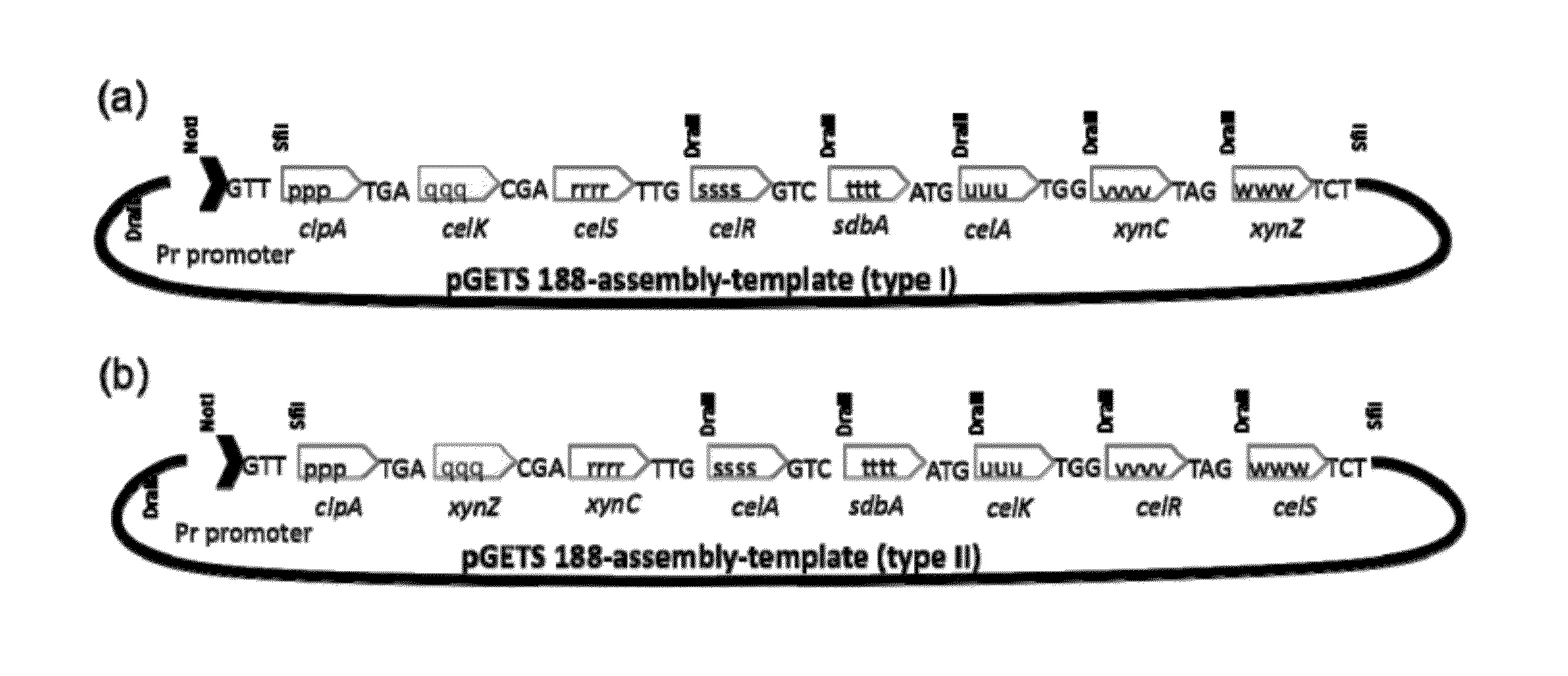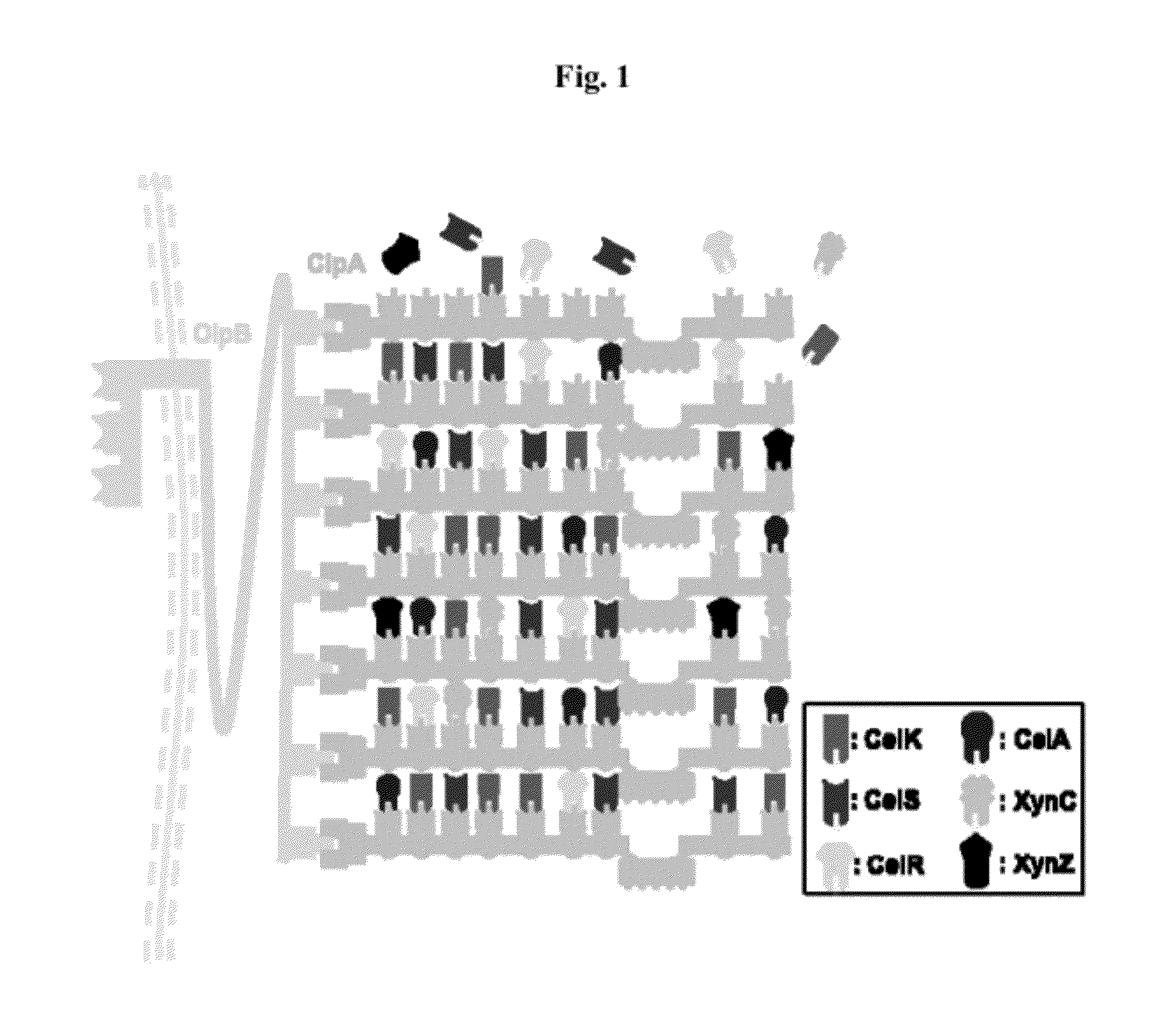Expression system for producing multi-enzyme complexes and uses thereof
a technology of expression system and enzyme complex, which is applied in the field of expression system for producing multi-enzyme complexes, can solve the problems of fermentable sugars trapped inside the lignocellulos
- Summary
- Abstract
- Description
- Claims
- Application Information
AI Technical Summary
Benefits of technology
Problems solved by technology
Method used
Image
Examples
example 1
Preparation and Characterization of B. subtilis Host Cells Expressing High-Order Cellulosomes
[0042]DNA fragments encoding Clostridium thermocellum ATCC 27405 scaffolding protein CipA and cellulosomal enzymes exo-glucosidases CelK and CelS, endo-glucanase CelA, and xylanases XynC and XynZ were amplified by PCR using the KOD-Plus kit provided by TOYOBO CO., LTD., Japan. Scaffolding protein CipA contains one cellulose-binding module (CBM), one surface-layer homologous modules (SLH), and nine Type I cohesin domains.
[0043]The PCR products were cloned into plasmid pCR-XL-TOPO using the TOPO XL PCR Cloning Kit (Invitrogen, CA) and introduced into E. coli host cells following the method described in Mandel and Higa (Mandel and Higa, 1970). DNA plasmids were prepared from positive transformants using the Qiagen Plasmid Midi Kit (Qiagen, CA) and subjected to restriction enzyme digestion to produce fragments encoding the above listed cellulosomal proteins. After being extracted from agarose ge...
example 2
Preparation and Characterization of B. subtilis Host Cells Expressing Two Types of High-Order Cellulosomes
[0058]In this study, two types of designed operon with genes in specific orders were constructed in B. subtilis using the methods described in Example 1 to express C. thermocellum “designer cellulosomes”: Type I: cipA-celK-celS-celR-sdbA-celA-xynC-xynZ; and Type II: cipA-xynZ-xynC-celA-sdbA-celK-celR-celS. See FIG. 4(a) and FIG. 4(b). More specifically, the eight cellulosomal gene fragments were ligated into the pGETS 188 vector in designated orders and transform into B. subtilis by the OGAB method. Pr promoter was used as the sole promoter to drive the expression of the genes. A specific CI repressor mutant B. subtilis strain, BUSY 9797, was employed to improve the success rate of plasmid construction. Construction of the two desired plasmids was confirmed by Eco RI restriction enzyme digestion assay. Correctly-constructed plasmids, as well as empty pGETS 188 vector (control), ...
PUM
| Property | Measurement | Unit |
|---|---|---|
| pH | aaaaa | aaaaa |
| pH | aaaaa | aaaaa |
| concentration | aaaaa | aaaaa |
Abstract
Description
Claims
Application Information
 Login to View More
Login to View More - R&D
- Intellectual Property
- Life Sciences
- Materials
- Tech Scout
- Unparalleled Data Quality
- Higher Quality Content
- 60% Fewer Hallucinations
Browse by: Latest US Patents, China's latest patents, Technical Efficacy Thesaurus, Application Domain, Technology Topic, Popular Technical Reports.
© 2025 PatSnap. All rights reserved.Legal|Privacy policy|Modern Slavery Act Transparency Statement|Sitemap|About US| Contact US: help@patsnap.com



